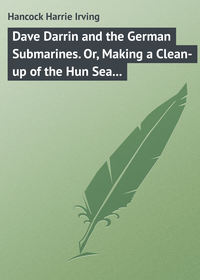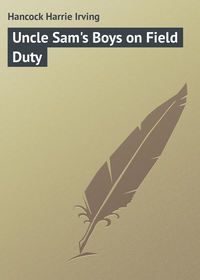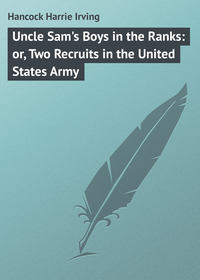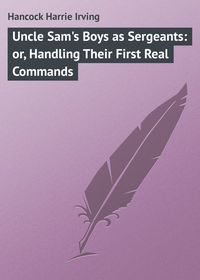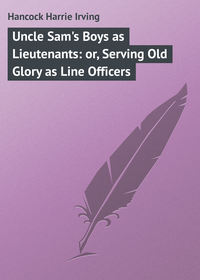 полная версия
полная версияThe Motor Boat Club at the Golden Gate: or, A Thrilling Capture in the Great Fog
"Sufferin' joss-sticks!" wailed the guide. "Here come the chinks – number-one man and all!"
The door of the bunkroom burst open. Through the doorway rapidly advanced the gorgeously-dressed Chinaman whom Tom had supposed to be the proprietor of the store beyond. Back of him came four plainly-attired Chinamen with as hard-looking, evil faces as could be found in all Chinatown's quagmire of vice.
"This ain't my doings, Ling!" wailed the guide, quailing before the stern glances of the yellow leader – the "number-one man." "I told this young fellow he'd have to quit. Let us out."
"Yes; let us out!" repeated Tom Halstead, staring undauntedly into the eyes of Ling.
"Put him down," ordered Ling, nodding scowlingly at the stranger whom Halstead supported. "Then, maybe, we see what we do with you."
The air was full of danger of the most awesome kind. Though not a weapon showed, as yet, each of the four Chinese behind the proprietor stood with his hands thrust up into his sleeves. A Chinaman always carries his weapons up his sleeves, whence he can bring them down, into action, with incredible rapidity.
"Now, don't think you've got me frightened," uttered Tom Halstead, sturdily, gazing undauntedly at the Chinese. "There isn't any scare in me when I'm dealing with people like you. If you make one single false move you'll be the ones who'll be sorry for it. Ling, I'm going to take this young man out of here. His friends know where he is, and they've sent me here to get him. I'm going to take him out of here, chop-chop. If I'm not out of here in another minute or so, then this young man's friends will bring down police enough on you to clean the place out."
Ling laughed contemptuously.
"Oh, you may think you have money enough, and 'pull' enough, to keep the police from troubling you," jeered young Halstead. "But, if this young man's friends get after you, it'll make a noise that the police can't shut their ears to."
Two of the men behind Ling stood blocking the doorway. The other two, by now, were edging around to get on either side of the unflinching boy.
"You yellow scoundrels, get back, and stay back!" commanded Tom, glaring at them sternly.
There comes into notice, now and then, a man who has enough of the magnetic quality of bravery to hold a mob back. Tom Halstead was possessed of the grit needed for such an undertaking.
"Get out of the way, Ling – you and your heathen hatchet men," commanded the young skipper, resolutely. "I'm going past you. If I find any fellow in my way I'll knock him down. If you fight back, it'll be the finish of you and of this place. Gangway, you yellow idiots!"
Still supporting, half dragging, the dazed young banker, Tom Halstead grittily pressed his way to the doorway and through it. One of Ling's henchmen attempted to stand immovable, but Halstead, with a quick blow of his open hand, sent the fellow stumbling backward.
"If you're thinking of creeping up behind me, don't try it," advised Halstead, as coolly as ever, as he started across the outer room.
He gained the closed door connecting with the outer store. Pausing here, a moment, he beheld two of Ling's yellow-visaged fellows creeping toward him.
"Back for yours – that'll keep you out of trouble," barked the young skipper, coolly, without raising a hand to defend himself. Then he threw the door open, calling backward over his shoulder:
"Don't you dare let this young man in here again, Ling. If you do, it'll wind you up."
With that the motor boat boy contrived to pilot his charge swiftly through the store. He was not safe until he had passed the last of these yellow men, and the young skipper knew it. Yet, at last, he had the stranger out on the sidewalk, one hand up to signal the driver of the cab.
The guide, keeping close to the motor boat boy, had managed to get out with him. But the little fellow was shaking as though seized with the ague.
"Get into the cab, and help me take the young man in," ordered Tom, and the guide was glad, indeed, to dive inside the carriage. In another moment they were driving away.
"Say, but you've got the nerve!" chattered the guide, his teeth knocking together.
"Maybe you'd have some nerve if you'd learn to leave hop alone," rejoined Halstead. "Hop" is the Chinatown name for opium.
Halstead sat on the rear seat, supporting the young banker beside him. In a little while the cab again halted in front of Yum Kee's restaurant.
"Here," said Halstead, producing a ten-dollar bill. "Take this. Skip as soon as you like."
"You oughter gimme more," whined the guide.
"I've given you all I agreed. No use trying to get any more."
The guide, thereupon, sprang out, vanishing within a few seconds. Going to the doorway of the restaurant, yet standing where he could keep a close watch on the cab, Tom uttered a long, low whistle. Messrs. Baldwin and Ross saw him instantly, and came hastening out. By the time they reached the cab the young skipper was inside again.
"Is this your young man?" asked Halstead, almost in a whisper.
"Yes," nodded Baldwin, a jubilant gleam showing in his eyes.
"Better jump in, then, sir, so we can get away quickly."
Gaston Giddings now leaned against Tom's shoulder, sleeping the sleep of drugged stupefaction.
"How on earth did you find him so soon?" questioned Joseph Baldwin, leaning forward when the cab had gone beyond the confines of Chinatown. Tom told the whole story, simply and modestly.
"Young man," uttered Jason Ross, solemnly, "I don't believe you have any idea, yet, of how huge a risk you ran yourself into. The Chinese criminal is desperate at all times, but ten-fold more so when he's on his own ground, surrounded only by his own crowd."
"Well, I got out, didn't I?" smiled the young skipper, coolly.
"Yes; but I marvel at it."
"I understand more and more why Delavan recommended these youngsters to me," breathed Joseph Baldwin, gleefully. "'Ready for anything,' he told me, was the motto of the Motor Boat Club boys."
When the cab rolled out onto the dock Jeff Randolph was found pacing back and forth on the landing stage. No other member of the crew was in sight, and Jeff stated that none of the others of Mr. Baldwin's party of guests had yet returned.
Gaston Giddings, still unaware of his surroundings, was helped aboard the tender. A swift trip was made to the "Panther," and the unfortunate young man was immediately carried below to be put to bed in one of the stateroom berths.
Half an hour later Mr. Baldwin's other guests returned from dinner. Jeff, who had gone back to meet them, brought them on board, next going back to await the arrival of Third Officer Costigan and the crew. Dr. Gray hastened below, to attend to Giddings, and to keep him quiet, also, after the crew should come on board.
As for Captain Tom, after receiving Ab Perkins's report that all was well aboard, he went to his own cabin, calling Joe Dawson, through the speaking tube, to join him. Here Joseph Baldwin found both youngsters.
"Captain Halstead, how much did you spend on my account, to-night?" asked the owner.
"Altogether, sir, twelve dollars on the guide."
"Never mind about any change, then," rejoined Mr. Baldwin, passing over a bank note.
"I think I can make change for that, sir," retorted Skipper Tom, his color rising. "I'm not out after 'tips,' you know, sir," he added, with a smile.
Producing a roll of money from an inner pocket, Halstead counted out eighty-eight dollars, which he handed to the owner.
"You may refuse, now, but I shall be even with you later," remarked Joseph Baldwin. "And now, Captain, as soon as you can, after the crew comes aboard, I want you to put out to sea. I'll give you more explicit orders as soon as we're seven or eight miles west of the coast."
"Very good, sir," replied Captain Tom, saluting as the owner turned to leave the captain's cabin.
"You've been running into a bit more excitement, have you?" queried Joe, smiling.
"A bit," laughed Halstead. Dawson asked no further questions.
At a few minutes after midnight Mr. Costigan returned with his shore party.
"It's your watch below, Mr. Costigan, until eight o'clock in the morning," First Officer Ab Perkins informed the third officer. "When you are called to turn out we'll be at sea."
"Very good, sir," replied Costigan, and went below to seek his berth. Neither the third officer nor any of the crew had any suspicion that anything unusual had happened this evening.
"Where's Mr. Costigan?" inquired Captain Halstead, coming forward.
"Gone below to sleep, sir," Ab replied.
"Then I'm afraid you'll have to rout him out. He'll have to stay on deck until he has piloted us through the Golden Gate. I want to be under way within five minutes."
Somewhat chagrined, Ab Perkins sent one of the crew below for the third officer. Costigan was speedily in evidence.
Now, one of the motors began to chug briskly below, and the two bow anchors came speedily up, being stowed by the watch. Joe was in the engine room with Jed Prentiss, while Captain Tom Halstead, feeling prouder and happier than ever in his life before, climbed to the bridge up behind the pilot house. After him went Dick Davis, whose watch it was to stand. Mr. Costigan, after seeing the anchors stowed, started for the bridge also.
"Give the engine room slow speed ahead, Mr. Davis," directed Tom.
Dick gave the bell-pull at the bridge rail the required jerk. The "Panther" began to move gracefully ahead, while Mr. Costigan, with the pilot-house speaking tube in his hand, called down the helmsman's orders.
"Dick, this is the real thing!" whispered Tom Halstead, jubilantly, in his comrade's ear while Costigan was busy at the speaking tube.
"It's as fine as bossing a liner," rejoined Dick Davis, enthusiastically.
"Better!" declared Halstead.
Dick presently signaled the engineer for more speed. The "Panther" ploughed through the waters of the bay, toward the Golden Gate.
As Tom Halstead peered through the night ahead he felt another ecstatic thrill. It was all so fine, so glorious! No doubt it was better for him, at this moment, that he could not foresee all that lay ahead of him.
CHAPTER VII
DICK TAKES THE RESCUE BOAT TRICK
It wasn't long before First Officer Ab Perkins also climbed the stairs to the bridge.
"If this craft runs on the rocks, it won't be for want of officers at their post," laughed Skipper Tom, gleefully.
"I couldn't keep away," confessed Ab. "It's the first time in my life I've ever stood on a real bridge by right. Oh, but this is a different thing altogether from the tiny bridge-deck of a fifty-foot boat!"
Third Officer Costigan paid no heed to the motor boat boys. Though Costigan had never held higher rank than he now enjoyed, standing watch on a bridge was no new sensation for him. The young Irishman thought, mainly, of the time when he would have the "Panther" through the Gate and well off the coast. Then he could turn in below.
Presently a fifth person joined the little squad on the bridge. It was Joseph Baldwin.
"You've a clear night and an easy sea, Captain," smiled the owner. "It's a fortunate sort of start for you."
"Yes, sir."
"When you're well clear of the Gate, Captain, look in on me down in the main cabin, and I'll give you your sailing orders for the night."
"Yes, sir."
Halstead knew his own dignity on the bridge. He was on duty, and did not attempt to engage the owner in any conversation other than that which concerned his present duties. Mr. Baldwin went below just after the "Panther's" prow was turned into the beginning of the Golden Gate, that magnificent approach to San Francisco harbor. The Gate is some two miles long, and nearly a mile wide, with an abundance of deep water for the passage of the largest craft afloat.
"What speed, sir?" asked Dick Davis.
"Ten miles is fast enough in this channel, isn't it, Mr. Costigan?" inquired the young captain.
"About as much as is best, sir."
Dick, at a sign from Halstead, communicated the order to the engine room. Twelve minutes later the "Panther" was clearing the Gate, leaving a track of foam behind her as Davis signaled for increased speed.
Joe, leaving his first assistant below at the motors, now joined the bridge squad.
"If there's nothing more, Captain," suggested Dawson, "I'll turn in below for the night."
Captain Halstead nodded. Soon afterwards he went below, to the main cabin.
"I've come to report for orders, Mr. Baldwin," he announced.
"They're simple enough," replied the owner. "Clear the coast by some twenty miles; then cruise south, at not too great speed – say, about twelve miles an hour."
"Do these orders hold until changed, sir?"
"Yes, Captain."
Tom saluted, then turned as though to leave the cabin, but Mr. Baldwin called him back.
"You're not needed on the bridge yet, Captain. Remain with us a little while, if you feel like it. You can see that Dr. Gray is keeping his own watch down here in the main cabin."
At that moment the physician, an elderly man, stepped out of a stateroom, closing the door after him.
"There! My patient will sleep for some hours, I think. I'll take the upper berth in his room to-night, so that I can hear him and attend to him if he wakes. Ah, good evening, Captain. Or is it good morning? I have been told of your fine work – on land, at that."
"Is Giddings going to be in anything like his right mind when he wakes?" asked Mr. Baldwin.
"Oh, in a general way, I think he'll know what he's saying," replied the physician. "But he won't be at all bright before thirty-six hours have passed. Even then I can't guarantee him. Opium drives him to the verge of mania."
When several of the others had engaged in conversation, and the doctor had taken a seat near the young captain, Tom asked:
"Is opium smoking a very great evil in San Francisco, Doctor? That is, do very many take to it?"
"Not a very large proportion of the white population, I am glad to say," responded the physician. "Still, when the hop habit does get hold of our white people it works fearful havoc with them. Opium and morphine streak all the crime in San Francisco. These habits are the horrible revenge that the Chinaman has taken upon the city for the persecution the Chinaman once suffered at the hands of our hoodlums."
"Then opium and morphine are largely responsible for the crime and vice in the big city we have just left?" asked Halstead.
"No; I won't say they're responsible," replied Dr. Gray. "But they color the wickedness of San Francisco in their own way. There's a heap of wickedness in every large city, but the crimes and vices here take on aspects that are tremendously due to the use of opium and morphine by the criminal classes. A very large percentage of our San Francisco jailbirds use either opium or morphine. These drugs give them a lower order of intelligence, and make them more cowardly, though often more desperate when they find themselves driven into a corner. Captain Halstead, be sure you never allow yourself to be tempted to use either of those drugs."
"Thank you; I don't believe I shall," smiled the young skipper. "Especially, after what I've seen to-night."
"Great as the curse of alcohol is," added Dr. Gray, "the bane of opium is ten-fold greater. In two or three generations it would ruin any race."
"Then why isn't the Chinese nation destroyed?" asked Halstead.
"Because, although we have imported these dread habits from China, only a small proportion of the Chinese people use the drugs. Those who do are the outcasts of China."
It was growing late, so the young skipper rose, inquiring whether the owner had any further orders for him.
"None, thank you, Captain," replied Mr. Baldwin.
Tom thereupon took his leave, returning to deck. The "Panther" was now miles westward of the coast.
"Ugh!" shivered young Halstead, as he stepped out on deck. Though it was February, the air had been all but balmy in town. Out on the bay there had been a little more chill in the air. But now, out on the wide expanse of the ocean, there was a cold, damp wind blowing that seemed to bite to the marrow after the bright warmth of the main cabin.
Tom promptly stepped into his own cabin, taking down his deck ulster and donning it. Then he made his way to the bridge, where Dick Davis was pacing from side to side.
"No; I don't want any ice cream, thank you," grinned Dick, as his captain joined him. Davis, who wore a reefer, was beating his arms against his sides as though to keep warm. "I've been wishing, Captain, I could get below for my ulster."
"Go ahead," nodded Halstead. "I'll walk the bridge until you return." Dick needed no urging, but made speed for his stateroom below. When he came back he looked more contented.
"Queer climate, this," he remarked.
"Yes," agreed the young skipper. "I'm told the thermometer never shows a very low marking, but that the night air chills one down to the marrow of his bones."
For five minutes more young Halstead remained on the bridge, then went below, after having left the customary instructions to call him to the bridge in case he was needed.
"Well, it's great to walk the bridge of as fine a craft as puts out of San Francisco," Dick told himself, later on in the night. "But at night it's mighty lonesome. I almost wish I could call one of the deckhands up here to talk to."
Of the seven seamen of the crew, one was assigned to work under the first officer's orders during the daytime. The remaining six were divided between the two watches. Of the three now at Davis's orders, one was in the pilot house, for the purpose of relieving the quartermaster whenever required. A second seaman, at night, stood out far forward as bow-watch. The third made regular trips of inspection around the yacht, unless ordered to some other duty.
Jed Prentiss, sitting all alone down in the motor room, made the sixth of those who were now awake on board the "Panther." At starboard and port the colored running lights gleamed; a third light, white, twinkled from the foremast-head. On the bridge stood a powerful searchlight whose rays could be turned on at will.
Thus manned, the "Panther" swept on steadily over the ocean, now headed south. The solitary, boyish figure pacing the bridge, represented in the night the brains and the present master-hand of this yacht, which, equipped with a single three-inch cannon at the bow, could have outrun or destroyed all the navies, combined, of ancient times.
Through the night the sea roughened a good deal. The wind blew more freshly, coming down off the land from the northeast. Still, the yacht was in no labor in the sea, and the sky remained bright overhead. So the second officer did not feel it necessary to disturb the rest of the captain.
At a quarter of eight in the morning, however, with the sun hidden behind a haze, Dick pressed the button that sounded the electric vibrating bell over Tom Halstead's berth. Then Davis picked up the mouthpiece of the speaking tube to the pilot house.
"Call the port watch," directed Dick, when the seaman had answered.
Captain Tom came up on the bridge, pulling on his ulster as he came. He greeted Dick, then stood looking about at the sky.
"It has freshened up a good deal in the night," remarked the young skipper.
"Yes; I thought, sir, you'd want to see the weather while the watch was changing."
Third Officer Costigan was not long in appearing, greeting his two superior officers as he reached the bridge.
"Does this weather spell trouble coming on this coast, Mr. Costigan?" questioned Halstead.
"It'll most likely turn rougher, sir. Sometimes we get a gale out of the northeast in February, though not as often as you do on the Atlantic. That's all I can say, sir. How's the glass? The barometer, you see, sir, is behaving like a gentleman at present."
As Dick left the bridge at the changing of the watch, Tom followed him. Halstead went to his own cabin, where he ordered his breakfast served. This meal eaten, the young skipper, who still felt the fatigue of late hours the night before, threw himself down on a divan. Though he had not intended to sleep, in less than five minutes Tom Halstead had traveled all the way to the land of Nod.
Nor did the increased rolling and pitching of the "Panther" disturb him; if anything, it lulled the young skipper into sounder slumber.
By ten o'clock the gale was going more than forty miles an hour. At eleven Ab Perkins turned the knob of the door, stepping inside. As Ab stood there looking at the occupant of the divan, moisture dripped from the ulster of the first officer.
"I guess we need you on deck, sir," roared Ab, shaking the young captain's shoulder. In a twinkling, Halstead was awake. In another instant he was on his feet.
"Weather is booming a bit, eh?" cried Captain Tom, eagerly.
"Nothing near as much, sir, as this craft can stand with comfort," Ab responded. "But we're coming up with a schooner under bare poles and wallowing badly. Foretop-mast blown away, too, and some of the bowsprit missing."
"Then you did right to call me," rejoined Halstead, pulling on his shoes swiftly, and standing up to don his cap and reefer. "I'll go on the bridge at once."
Baldwin and three of the passengers were on deck as Captain Tom appeared. Halstead nodded their way, then hurriedly climbed the bridge stairs. Now, he turned to take a look at the schooner. She lay dead ahead, for Costigan had ordered the "Panther's" course altered so as to speak the craft in distress. She was still about a mile distant, but for a keen-eyed sailor it needed no glass to make out the fact that the three-master was in utter distress.
"Hard luck, that, in only a forty-mile blow," muttered Tom.
"Wind-gauge shows forty-eight, sir," replied Mr. Costigan.
"Anyway, someone must have been dozing on that schooner, to let her canvas be blown away in such a wind," contended the young skipper.
Then Tom picked up the marine glasses, for a good look at the craft.
"Why, confound it, she has nothing left but a dinghy at the stern davits," muttered Captain Halstead. "I'm afraid, Mr. Costigan, we've got to get out our own boat."
"I'm afraid so, sir."
"Then tumble out the starboard watch."
The order was given through the pilot house speaking tube. The sailor down there with the quartermaster went below at lively speed, routing out the sleeping watch.
By the time they were on deck Tom Halstead was manœuvring the motor yacht around to leeward of the wreck.
"Schooner, ahoy!" he bellowed through a megaphone, from the bridge end.
"Yacht ahoy!" came back the faint answer on the breeze. "This is the schooner 'Alert,' Seattle; Jordrey, master."
"What help do you want, 'Alert'?"
"We're ready to abandon our vessel. Send us a boat, if you can."
"Boat it is, then, Captain," Tom bawled back, lustily. "Stand by to help our boat make fast alongside your lee quarter!"
Then, turning, glancing down at the deck, Tom called:
"Mr. Davis, the rescue boat is the second officer's trick!"
"Glad of it, sir," retorted Dick, his eyes glistening.
"Lower the port life-boat. Take four men at the oars and one for the bow. You'll have to row. The power tender would be worthless in this sea. Mr. Perkins will take the bridge. Mr. Costigan and the quartermasters will help you off, Mr. Davis."
Officers and men all moved with perfect discipline. With a merry roar they lowered the life-boat. A boarding gangway was lowered at the side, and down this the crew of the life-boat scrambled. Dick Davis took his place at the tiller.
"Cast off," he commanded. "Shove off. Let fall oars. Now, then – at it, hearties!"
From owner and passengers a cheer went up as the boat put off in such famous style. In another instant, however, the boat tossed like a cork on a high, rolling wave. Then it went down in the hollow between two billows. It was up in sight, an instant later. The men at the oars were doing their work with a will. Over the water struggled the life-boat, and then turned to come up under the lee quarter of the schooner.
Suddenly Captain Tom Halstead clutched desperately at the bridge rail, his face going deathly white.
"Merciful heaven!" he quivered, staring hard. For, near the crest of a wave, the life-boat heeled. Another big wave caught her.


